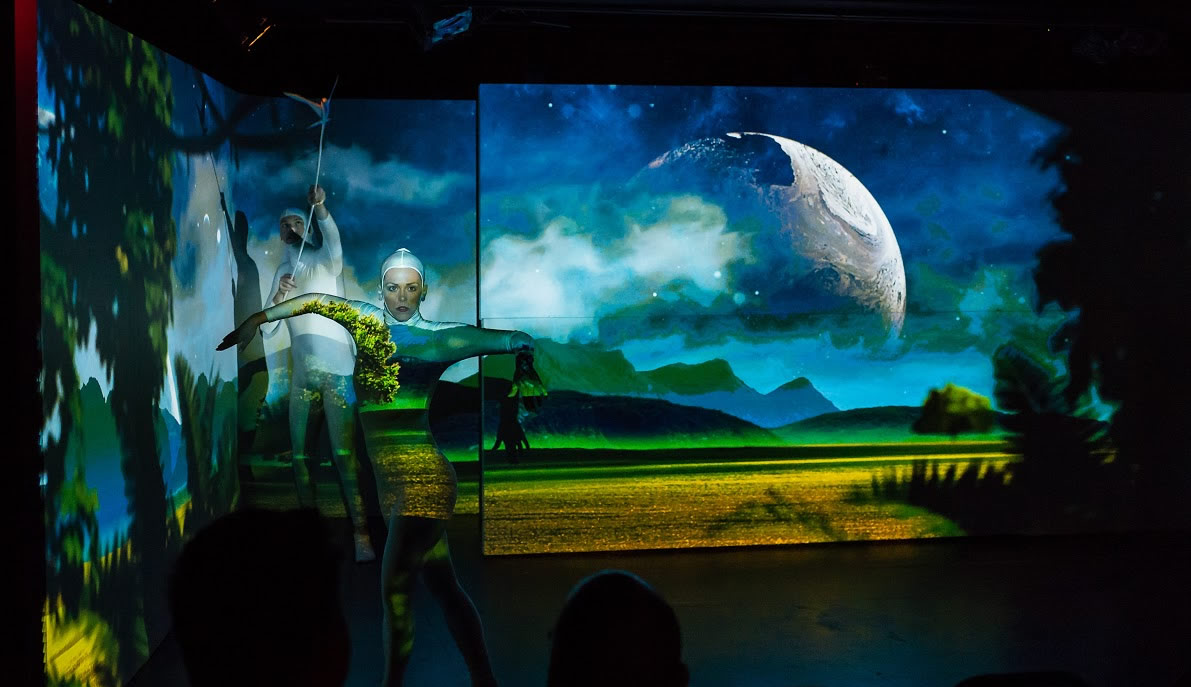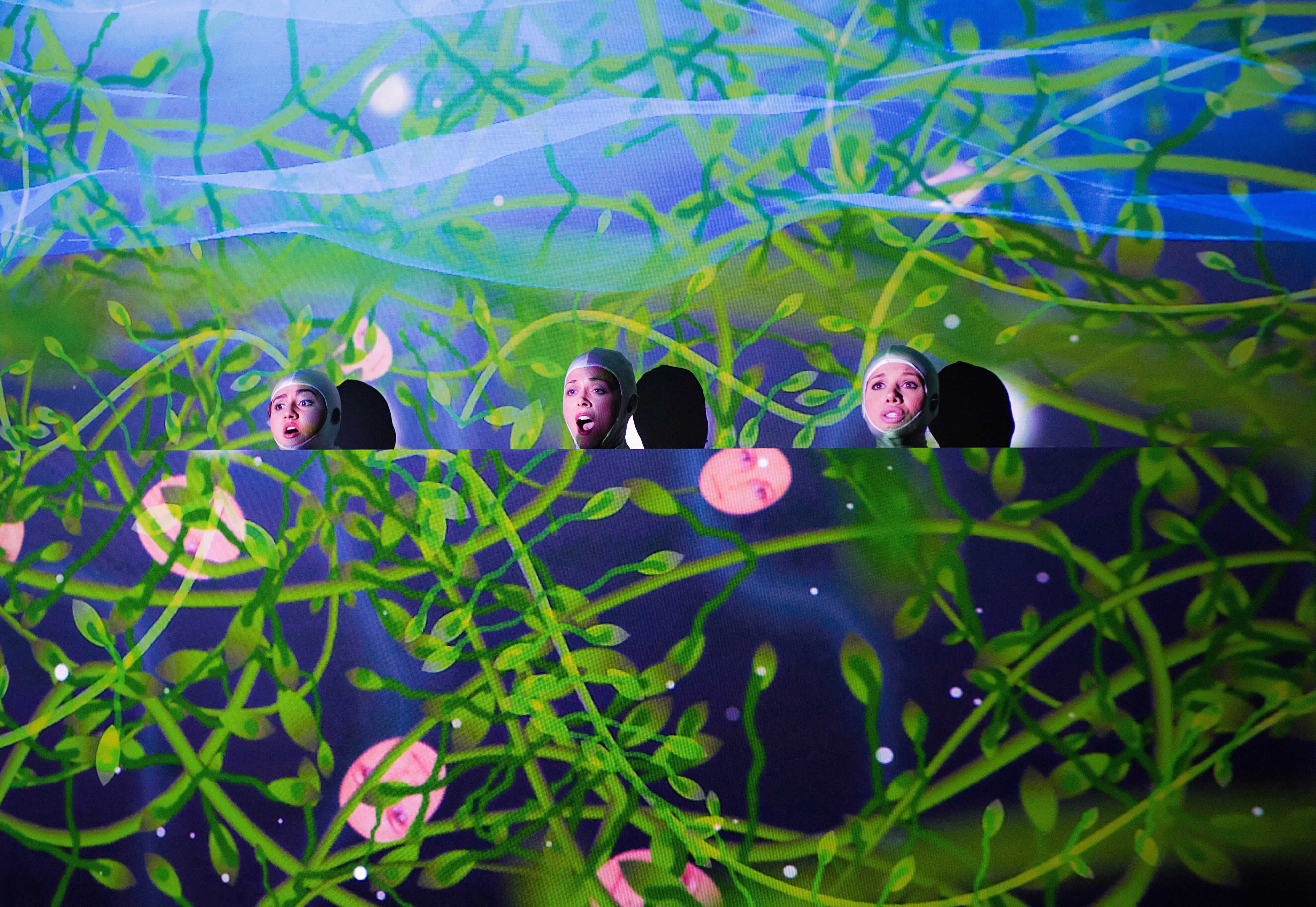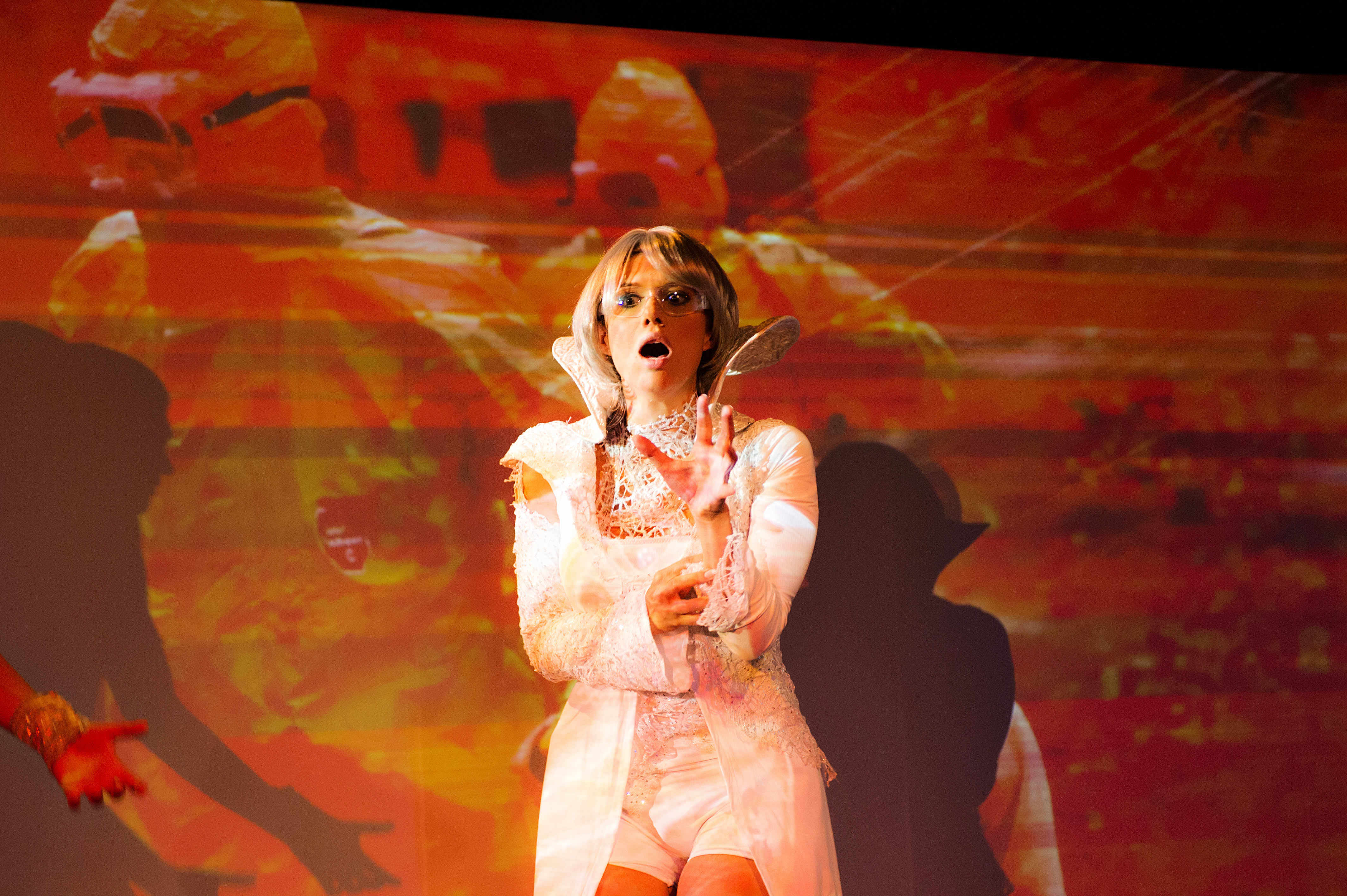
SoBe Arts’ ‘Intelligent Systems’ gives opera a multimedia Big Bang

Danielle Buonaiuto as Dr. Helium White in “Intelligent Systems.” Photo by AR McFarlane.
Richard Wagner never quite got the theatrical effects he was looking for in his gigantic operas, mostly because he died in 1883, before the advent of cinema.
But Carson Kievman is a little luckier than that: the founder and director of the SoBe Institute of the Arts in Miami Beach has benefited from today’s digital technology to create the visual images he has had in minds for decades in his operas and musical theater pieces.
For his current project, the opera Intelligent Systems, now playing in its world premiere run in the tiny black box space of SoBe Arts’ Little Stage Theater, Kievman is able to take his audiences into space and the future through digital projections that were impossible 35 years ago when he began writing the piece.
“It’s not like taking an (existing) opera and making a multimedia production of it,” Kievman said. “It is a multimedia opera from beginning to end.”
Intelligent Systems, begun in 1980 under a National Endowment for the Arts grant and commissioned for development by Germany’s Donaueschingen Festival in 1982, is a sci-fi-esque tale of civilization as seen on a planet much like ours in a parallel universe in which natural catastrophes ultimately lead to the development of a race of humans. They, of course, destroy their planet, but a new species of humanity arises from the chaos.
“If they had been able to do it back then, they would have had to use slides, which would not have been acceptable, because a lot of the action takes place on the screen. The other thing they could have done is made a 35 mm film, but that would have been prohibitively expensive and it would not have been flexible,” he said.

Left to right: Zaray Rodriguez as Professor Nitrogent Scarlett, Danielle Buonaiuto as Dr. Helium White, and Nathalie Avila as Mission Specialist Hydrogen Jade, in “Intelligent Systems.” Photo by David Ramos.
Last year, Kievman premiered his chamber opera of mental illness, Fairy Tales: Songs of the Dandelion Woman, using digital projections to conjure up the visions being seen by the ailing female protagonist. Intelligent Systems offers vistas of distant planets, starbursts and pandemics; Alain Lores, who designed the digital projections for Fairy Tales, takes on the same task for the new piece.
The cast includes sopranos Nathalie Avila as Mission Specialist Hydrogen Jade and Danielle Buonaiuto as Dr. Helium White; mezzo Zaray Rodriguez as Professor Nitrogen Scarlet; tenor Timothy Stoddard as Flight Engineer Oxygen Cobalt; baritone David Robinson as Cmdr. Plutonium Plum; and bass-baritone Eric McConnell as Science Officer Curium Black.
The show is directed by veteran opera director Jeffrey Marc Buchman, with choreography by Rosa Mercedes, costumes by Camila Haith, and lighting by Patrick Tennent. The 13-piece chamber orchestra is conducted by Mary Adelyn Kauffman, an adjunct professor at Florida International University who conducted Fairy Tales last year.
Getting the cast together proved to be difficult, and not just because the music itself is challenging.
“We couldn’t travel because we don’t have that kind of budget, so we had to do Skype auditions all over the country,” Kievman said. In the end, three Miami-area musicians — McConnell, Rodriguez and Avila — became part of the cast. “They’re all doing a great job,” he said.
Kievman said he was inspired by British physicist Stephen Hawking’s work on the Big Bang in coming up with the idea for his opera, which he sketched out in storyboard format with text; the resulting libretto is a series of chronological impressions rather than a strictly linear story. He had composed about 65 percent of the music and begun rehearsals in New York for eventual performance at Donaueschingen when the project was canceled.
“I kept it going for a while. I made a couple of orchestral suites out of the music and we did a reading of the first scene with the Lake George Opera orchestra,” he said. “But basically, nothing happened with it, and I forgot about it until ‘Fairy Tales.’”
Kievman began updating the work after the Fairy Tales premiere and finished composing it last fall.
“With digital mapping, it was possible to do it, and I got the idea for doing it after we did ‘Fairy Tales’ and realized it was possible now,” Kievman said.
The long period between gestation, composition and performance may have worked in its favor. The issues it discusses, such as climate change, are much more urgent today than they were in the 1980s.
“The timing couldn’t be more perfect for bringing this work to life. We certainly weren’t thinking about these issues 30 years ago,” Kievman said.

Nathalie Avila as Mission Specialist Hydrogen Jade in “Intelligent Systems.” Photo by David Ramos.
Kievman thinks Intelligent Systems would work well in cities with science museums, in that the opera could be presented in tandem with those institutions. He’s in talks with the Patricia and Philip Frost Museum of Science to premiere his next opera, Tesla, a biographical work about the eminent electronics pioneer Nikola Tesla, in the museum’s new Bayfront Park home when it opens next year.
“The museum’s chief science officer came to opening night, and he was really excited about it,” Kievman said.
Despite the cataclysms seen on stage in the opera, Kievman says he’s generally optimistic about the future.
“‘Intelligent Systems’ basically says that life doesn’t end, it’s just transformed. Matter doesn’t get destroyed, it moves on,” he said. “At the end of ‘Intelligent Systems,’ after the manmade annihilation, a new species pops up.”
It would be preferable for mankind to take action to stop its depredations, he said, but ultimately, what happens to the planet may be entirely out of our hands.
“(The opera tries) to see our world from a different perspective, of how important we think we are, but in the big picture of things, we’re really not,” he said. “We’re really part of nature, and nature has its own transformative progressions. And there’s not much we can do about that.”
Intelligent Systems can be seen Friday, Saturday and Sunday at SoBe Arts, 2100B Washington Ave., Miami Beach. Performances are at 8 p.m. on Friday and Saturday, and 7:30 p.m. on Sunday. Tickets are $25, $15 for students and seniors. Call 305-674-9220 or visit sobearts.org.
Recent Content
-
Artsarticle ·
-
Artsarticle ·
-
Artsarticle ·

